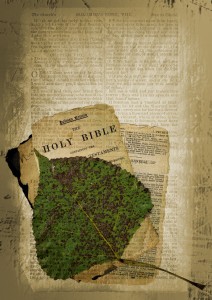
I’m not sure where the phrase “The Bible is not the Word of God; Jesus is” originated. The first time I heard the phrase, though, (on Rachel Held Evan’s blog) it was just short of life-changing. It became my go-to answer to those who used the Bible as a weapon to hurt me or others.
I say this show that I see how the phrase can be extremely liberating to those who are used to being oppressed by harmful Biblical messages.
I wanted to affirm that before I start deconstructing this phrase.
It’s been almost four years since I first heard that “The Bible is not the Word of God; Jesus is,” and I’m not sure I fully agree with it anymore. At the same time, I don’t disagree. But I think there’s more to the story here.
I want to talk about four things:
1. If “the Bible is not the Word of God; Jesus is” what does that say about the Hebrew Bible?
I cannot stand Christianity that pits the “Old” Testament against the New Testament. I’ve written before that there are some racist, white-savior-Jesus type implications behind this false dichotomy.
I worry that making Jesus “the Word of God,” over and against “the Bible” can easily lead to anti-semitism that views Christianity as “progressive” and “enlightened,” and Judaism as “backward.”
It can also work to erase the importance of the Hebrew Bible for Jewish people. Christians like Brian Zahnd often end up setting up their religion as somehow “better than” the very religion from which Christianity grew:
I am not comfortable at all with this kind of thinking. I am a Christian myself, but Jesus was a Jew. Jesus was raised in the teachings of the Hebrew Bible and quoted them frequently in his ministry. To pit Jesus against the “Old” Testament is ridiculous to say the least.
Last year, I picked up the book Psalms: A Spiritual Commentary, by M. Basil Pennington. An otherwise forgettable experience, one brief section of the book stuck out to me.
Pennington, a Catholic, describes a conversation with a Jewish rabbi, in which the rabbi explained to him, “What Jesus is to you, Torah is to us: The Word of God in human form.”
This has stuck with me, and comes to my mind every time I hear that “The Bible is not the Word of God; Jesus is.” For this Jewish rabbi, such was not the case. Torah is the Word of God. Can Christians learn something from that? I think so.
2. Can we even know Jesus, except through the Bible?
The idea that “The Bible is not the Word of God; Jesus is” has to take into account that most of our experiences with Jesus are filtered through the Bible. It’s nice to think that we can follow Jesus without placing the Bible on a pedestal, but how true is that?
Sure, there are a few extra-biblical sources that we can draw on as we try to learn who Jesus is. There is also mysticism and prayer, and church traditions.
But much of what we “know” about Jesus comes from the four gospels that made it into the book that we call the Bible. How do we “know” that Jesus fed the five thousand, or threw out the money changers? How do we “know” that he turned water into wine and calmed the seas?
Probably because we (or someone else like a priest or pastor) read it in the Bible.
I think “The Bible is not the Word of God; Jesus is” can be a liberating concept. But it’s liberating elements are still limited. Though we can claim mystic experiences that do not draw from the Bible specifically, those will often not be taken as seriously as the accounts of Jesus in the Bible (at least for those of us coming from an evangelical background).
And who put the Bible together?
Who chose which stories about Jesus were true and which ones were “extra-canonical?” Who says the gospel of Matthew is “truth” about Jesus, and the gospel of Mary is not?
Men in power have made those decisions throughout history.
Even if “the Bible is not the Word of God; Jesus is,” it is still often powerful men who decide what the “Word of God” is and what it is not.
3. If Jesus is the Word of God, then the Word of God is no longer “made flesh,” dwelling among us.
I am drawn to Christianity, because I love the idea from John 1:14 that states:
The Word became flesh and made his dwelling among us…
I think the story of Jesus as the Word of God made flesh is beautiful and powerful.
But Jesus died 2,000 years ago.
It can be argued theologically that Jesus is literally alive and “dwelling among us” today (depending on how you interpret the story of the resurrection). But I think even more conservative Christians will agree with me that the historical person of Jesus is not really living among us “in the flesh” right now.
So, if “the Bible is not the Word of God; Jesus is,” does that mean that the Word of God ceased dwelling among us 2,000 years ago? Does that mean the Word of God is now some intangible, spiritual substance that we cannot put our fingers on?
If Jesus alone is the “Word of God,” well, we don’t have the privilege of touching his scars, or even the hem of his garment, because even if Jesus is alive somewhere, he isn’t here.
I don’t like the idea of going through such a broken and hurting world, equipped with merely the “idea” of the Word of God. I want something physical, something real. Something made flesh and dwelling among us.
4. So…now what?
I hate to tear apart a phrase that I know has been liberating to so many people, and then leave you with nothing.
I don’t believe that Jesus alone is the “Word of God,” but I also don’t believe that we have to settle for hearing the “Word of God” filtered through the powerful men who put together the Bible.
I think back to the words of the rabbi that I quoted earlier, who said that Torah is the Word of God made flesh for Jewish people. I wonder why he would say something like that. I cannot know for sure, since the book I read did not share his reasons, and I am not Jewish myself so I do not have that perspective.
But I would guess that one reason could be that the Torah teaches people how to live in the wisdom and justice of God. And when we live in the wisdom and justice of God, the Word of God becomes flesh, and dwells among us.
For Christians, we read in the gospel of Matthew that Jesus did not come to abolish Torah, but to fulfill it. So much of the gospels center around Jesus fulfilling Torah, in fact: Jesus rejects worldly power, he preaches justice and love, he is in solidarity with the poor and the oppressed.
Maybe Jesus isn’t “the Word of God” made flesh simply because he’s Jesus. Maybe Jesus becomes the “Word of God” as he fulfills the law and the prophets: living justly, speaking truth to power, siding with the poor.
And maybe we can also be the “Word of God” made flesh as we do the same.
The book of Hebrews tells us that the Word of God is “alive and active.”
It’s not a book that sits up on a shelf. It’s not a formless historical figure that hasn’t stepped foot on the earth’s soil in 2,000 years. It’s something that’s alive and physical in our world today.
Maybe we hear the Word of God when we listen to protestors calling out, demanding justice. Or when we listen to the stories of abuse survivors and believe them.
Maybe the breath of God fills our lungs when we speak truth to power.
Maybe the Word of God is made flesh when we follow the example that Jesus, the Torah, the prophets, and so many others have set, and work to make our local communities safe, just, and equal.
The Bible is not the Word of God.
Jesus (alone) is not the Word of God.
God’s Word is still dwelling among us, and blessed are those who hear and do it.

















